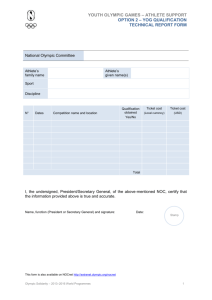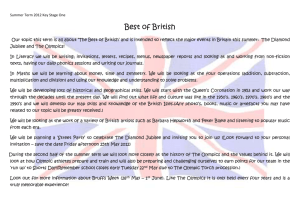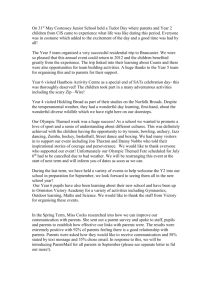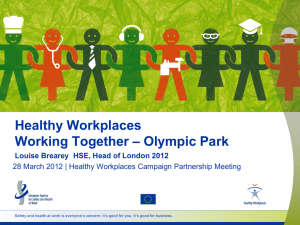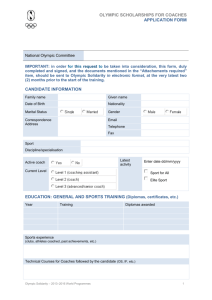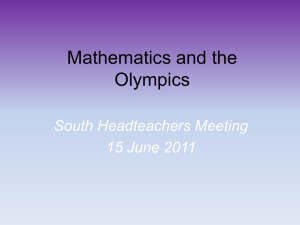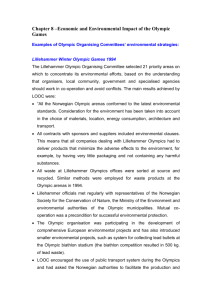Olympic values and ethics - Oxford Brookes University
advertisement
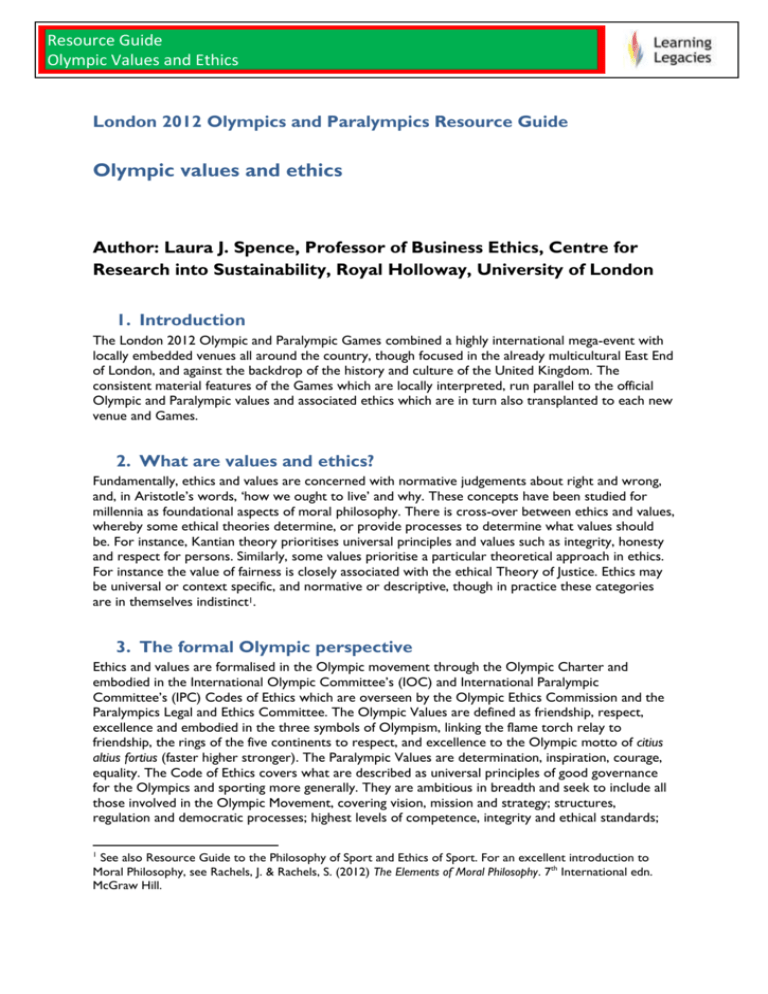
Resource Guide Olympic Values and Ethics London 2012 Olympics and Paralympics Resource Guide Olympic values and ethics Author: Laura J. Spence, Professor of Business Ethics, Centre for Research into Sustainability, Royal Holloway, University of London 1. Introduction The London 2012 Olympic and Paralympic Games combined a highly international mega-event with locally embedded venues all around the country, though focused in the already multicultural East End of London, and against the backdrop of the history and culture of the United Kingdom. The consistent material features of the Games which are locally interpreted, run parallel to the official Olympic and Paralympic values and associated ethics which are in turn also transplanted to each new venue and Games. 2. What are values and ethics? Fundamentally, ethics and values are concerned with normative judgements about right and wrong, and, in Aristotle’s words, ‘how we ought to live’ and why. These concepts have been studied for millennia as foundational aspects of moral philosophy. There is cross-over between ethics and values, whereby some ethical theories determine, or provide processes to determine what values should be. For instance, Kantian theory prioritises universal principles and values such as integrity, honesty and respect for persons. Similarly, some values prioritise a particular theoretical approach in ethics. For instance the value of fairness is closely associated with the ethical Theory of Justice. Ethics may be universal or context specific, and normative or descriptive, though in practice these categories are in themselves indistinct1. 3. The formal Olympic perspective Ethics and values are formalised in the Olympic movement through the Olympic Charter and embodied in the International Olympic Committee’s (IOC) and International Paralympic Committee’s (IPC) Codes of Ethics which are overseen by the Olympic Ethics Commission and the Paralympics Legal and Ethics Committee. The Olympic Values are defined as friendship, respect, excellence and embodied in the three symbols of Olympism, linking the flame torch relay to friendship, the rings of the five continents to respect, and excellence to the Olympic motto of citius altius fortius (faster higher stronger). The Paralympic Values are determination, inspiration, courage, equality. The Code of Ethics covers what are described as universal principles of good governance for the Olympics and sporting more generally. They are ambitious in breadth and seek to include all those involved in the Olympic Movement, covering vision, mission and strategy; structures, regulation and democratic processes; highest levels of competence, integrity and ethical standards; 1 See also Resource Guide to the Philosophy of Sport and Ethics of Sport. For an excellent introduction to Moral Philosophy, see Rachels, J. & Rachels, S. (2012) The Elements of Moral Philosophy. 7th International edn. McGraw Hill. Resource Guide Olympic Values and Ethics accountability, transparency and control; solidarity and development; athletes’ involvement, participation and care; harmonious relations with governments while preserving autonomy. Disciplinary processes for non-compliance are also outlined in the Code. Other values which are commonly referred to in the Olympic and Paralympic documentation are human dignity, human rights, social justice, peace, fair play, universality, humanism, environmental responsibility and sustainability. While much of the headline grabbing discussion around ethics and values is implicitly in general sporting issues such as doping, match fixing, corruption in gambling or other forms of cheating, in this resource guide, the nature, explicit use and application of ethics and values outside of generic sporting issues are the focus, in particular in relation to the London 2012 Olympic and Paralympic games. 4. What are the moral philosophical underpinnings of Olympism? The Olympic values and ethics seek to be universal, which can cause some difficulties and conflicts in the wide range of different cultural, socio-political and religious settings of the Games. There appears to be the unswerving belief and ambition that sport and the Olympic movement in particular are a force for moral good, ‘celebrating humanity’. Critics however argue that the approach taken is not representative of the global movement Olympism purports to be, but that the values and ethics are on the whole distinctively Western and sectarian. Nevertheless, there is no single foundation for the philosophy of Olympism. Much of the terminology such as respect, integrity, ethical standards and autonomy can be linked to the Kantian principle-based de-ontological approach. The more consequentialist approaches such as utilitarianism are reflected where the outcome is the focus, such as in the value of excellence, development and competence. Virtue theory relates most closely to a focus on values, drawing specifically on characteristics of the individual. Courage in particular, was one of Aristotle’s original cardinal virtues, and contemporary virtues may include determination, inspiration, integrity and solidarity. Contemporary theories are represented too, for example Habermasian discourse ethics promotes respect, equality, democratic processes, accountability, transparency and participation in the pursuit of peace. Finally, the concepts of friendship, care and harmonious relations are entirely in keeping with an ethic of care with its foundations in feminist theory. 5. Values and ethics in practice While there was much to praise in the London Games from an ethics and values perspective, a number of problematic areas of these and other Olympic events show inconsistent application of the espoused commitments. a. Political protest In the most extreme instances clashes of beliefs, values and ethics have resulted in significant controversy, protests and boycott of the Olympics for serious global and local political and ethical issues such as Nazi propaganda (Berlin 1936), post-War exclusions (Antwerp 1920), highlighting racism (Mexico 1968), and Cold War fuelled protest (Moscow 1980; Los Angeles 1984). Such problems, and these are just a few examples, do not sit comfortably with the core claimed values of friendship respect and equality. However some might suggest that in practice the Olympics is often used as a forum for the playing out of global political differences and the stances taken have little to do with the Olympics itself and more to do with the global stage afforded. b. Governance Corruption has been a recurring theme in relation to the IOC and the allegations of rampant bribery to secure support for applicant cities has been ongoing since the Salt Lake City games in 2002. In Resource Guide Olympic Values and Ethics 2004, the IOC vice-president was jailed for corruption. The highlighting of integrity, ethical standards accountability and transparency in more recent years in the activities of the IOC and the local organizing committees is in response to the accusations of low ethical standards which have dogged the governance of the movement. c. Inclusion The individuals and institutions governing the Olympics themselves have over the years been accused of imbalance due to the narrow representation of nationalities (French domination being an early characterisation), and more recently dominance by economically advanced nations, and the gender imbalance with low inclusion of women in senior positions. Inclusion was a major theme of the bid for the London 2012 Olympic and Paralympic Games. Targets were set in relation to the Olympic Development Agency on hiring local, previously unemployed, apprentice, Black Asian and ethnic minority and women (targets were not met on this latter category). Hence there are issues around the inclusion of marginalized voices in the practical activities required to create and maintain the Olympic Games. A special mention of the Paralympics is important here. This younger movement was started in the UK as a parallel event to the Olympic Games for disabled ex-military personnel in 1948. Beyond the usual sporting issues there are additional challenges around categorisation of disability, and for the first time at London 2012, the inclusion of a Paralympic athlete in the Olympic Games when a double amputee athlete ran in both Games’ 400m and 4x400m races. There are also emerging issues around ‘prosthetic ethics’ and the technologies available for countering disabilities, with athletes from less wealthy countries being disadvantaged. Most fundamentally, however, despite the Paralympic value of equality, there are substantial issues around the lower funding directed towards Paralympic athletes, the smaller scale of the event, lower media coverage and lesser respect for achievement compared with the Olympic Games. In the Paralympic Games 2012, broadcaster Channel 4 and dedicated sponsor Sainsbury’s invested significantly in the Paralympics and are credited with helping to create a more comparable level of excitement and attention around the Paralympic Games than previously. Some noted with regret the contrast between this success and the relentless day-to-day challenges of living as a person with disabilities in London and the UK. This was directly picked up in relation to one of the hottest ethical topics of London 2012; sponsorship. d. Corporate sponsorship The Commission for Sustainable London ‘Beyond 2012’ report identifies corporate sponsorship and supply chain labour standard challenges as the most critical issues that they felt unable to attend to adequately during the course of the Games, alongside food waste, managing volunteers and construction and infrastructure2. Commercialisation, it is argued, has become necessary to enable the extreme scale of the Olympics as a mega-event. Few seem to question that the scale is something which should be maintained, despite the financial implications for host countries. For good or ill corporate sponsorship has become an embedded part of the Games. Prior to the 2012 Games particularly, sponsorship caused some serious ethical concerns and scandals for the organisers. Particular issues were the selection by LOCOG of ethically and environmentally troubled companies BP and EDF as Sustainability Partners, and the exclusivity which food and beverage companies such as Coca-Cola and MacDonalds leveraged, not least because of the association of the fast food industry with obesity and unhealthy eating seeming incongruous in an event otherwise purporting to celebrate sporting and healthy lifestyles. Sponsorship by Visa was also criticised because of the requirement that tickets could only be purchased with a Visa card. In the 2012 2 See the London 2012 Olympics and Paralympics Resource Guide: Sustainability for further elaboration on these challenging aspects. Resource Guide Olympic Values and Ethics Paralympics too there was controversy because Atos was a lead sponsor, whose UK arm Atos Healthcare was responsible for ‘work capability’ tests seen by activists as unsuitable for determining receipt of sickness benefit for individuals with disabilities. Perhaps the biggest scandal relating to sponsorship at the 2012 games was the selection by LOCOG of Dow Chemicals to supply a sustainable £7m plastic wrap for the main athletic stadium. Dow Chemicals Company is a TOP worldwide sponsor of the IOC, alongside Atos, McDonalds, CocaCola, Visa, General Electric, Omega, Panasonic, Proctor & Gamble and Samsung. Dow Chemicals are associated with the Bhopal Disaster of the 1980s when tens of thousands were killed, with blame being given to poor safety, welfare and maintenance standards. One of the Commissioners for Sustainable London 2012, the sustainability assurance body for the London Games, resigned over the selection of Dow, and generated concern from NGOS such as Amnesty International, the Worldwide Fund for Nature and Greenpeace. Dow was chosen as the Official Carbon Partner for the Sochi 2014 Winter Olympics. The London Olympic Games and Paralympic Games Act 2006 and the Olympic Symbol (Protection) Act of 1995 give protection to the Olympic Brand as required by the IOC. The intention is to protect the Olympic brand and symbols, and disbar unofficial use or implied association with the Olympic movement or specific Games. In the case of London this resulted in some aggressive legal action that continued long after the Games had finished, protecting exclusivity of sponsoring companies. A relatively new and unresolved ethical issue here is the difficulty of controlling and limiting reference to the Olympic brand via social media. In short, it is difficult to match the issues relating to corporate sponsorship to any of the values or ethics to which the Olympic movement is committed, with the exception of the one big defending claim which some would argue justifies any ethical challenges: that the financial contribution of corporate sponsorship enables the Games to take place and reduces the burden on the public purse. e. Supply chain The supply chain is perhaps the region in which mega-events can have the biggest non-sporting impact, magnifying ethics and values through their expectations and requirements of their suppliers and their suppliers’ suppliers. For the London 2012 Games, LOCOG developed a detailed sourcing code which has the core principles of responsible sourcing, use of secondary materials, resource and energy efficiency, and focusing on healthy materials. The Code is impressive, also covering tendering processes and engaging with existing systems and standards such as the Suppliers Ethical Data Exchange, The Ethical Trading Initiative, the Soil Association, the Rainforest Alliance, Fairtrade, Forest Stewardship Council, Gangmasters Licensing Authority, the Marine Conservation Society, the Association for Organic Recycling, and British and International Standards (e.g. ISO14001, ISO9001, BS8901). Importantly, the code also outlined a complaints procedure. Despite this positive framework, its application was inconsistent. The London 2012 Games were hit by multiple accusations relating to the abuse of human rights and labour rights in their supply chain. These related to issues such as the sweatshop labour in Adidas’ Asian suppliers who provided the UK athletes and Games volunteers’ branded kit and child labour involved in making 2012 branded pin badges. The trade union and NGO supported movement, Playfair 2012, led a strong campaign to highlight the importance of a focus on labour standards in the London 2012 and future Olympics. f. Volunteering A further aspect affecting workers associated with the London Games relates to the 70,000 volunteers (the ‘Gamesmakers’). Seen as a great success in terms of engagement and community spirit, the volunteers were as much the face of the Games as the athletes. Nevertheless ethical issues of volunteering relating to exploitation of goodwill, provision of necessary training, support, and management, and equal treatment and respect in comparison to paid labour should be Resource Guide Olympic Values and Ethics considered. The extent to which a culture of volunteering has been established as a legacy of the 2012 Games remains to be seen. g. Local legacy Much of the justification for bidding for and investing in an Olympic Games is the local legacy which is enabled, despite contentions in the academic literature about the extent of local benefits for hosting mega-events. Legacy was a major part of the London 2012 bid, both in terms of massive investment in the disadvantaged East London area around the Olympic park and inspiring participation in sport. The London Legacy Development Corporation leads the post-Games initiative in terms of physical, social, economic and environmental regeneration of the main London site. Some controversy has arisen around the replacement of affordable housing stock suited to the local residents with facilities designed for a different socio-economic group. In sporting terms, the boost in sporting activity appears to have been rather short lived. Ultimately, the Olympics legacy will probably be mixed, difficult to measure, affect the strata of society unevenly and take many years to identify and emerge. 6. Final comment The London 2012 Olympic and Paralympic Games were ambitious in their targets for using the opportunity to host the mega-event as a social good beyond the parameters of the Games themselves. The guidelines, codes and architecture for ethical practice are on the whole to be applauded, though more work is needed in terms of the underlying moral philosophy. A major challenge for the future is to translate such Olympic ethics and values to future local Olympic host cities where the challenges will necessarily be different in emphasis. In conclusion continued work on the coherence and consistency of standards and their application, monitoring and assurance, which address the needs and idiosyncrasies of the local context as well as the global reach of the Olympic movement is to be strongly recommended. Doing so would provide the opportunity to build on the progress made and the lessons learned in the London 2012 Olympic and Paralympic Games. 7. Annotated Bibliography Academic literature The following books and article are useful broad introductions to Olympic ethics from the perspective of the Olympic idea and mega-events. Loland, Sigmund (1995) Coubertin´s Ideology of Olympism from the Perspective of the History of Ideas, Olympika: The International Journal of Olympic Studies, 4, pp. 49-78. Parry, Jim (1997) Ethical Aspects of the Olympic Idea. Ancient Olympia: IOA. Roche, Maurice (2000) Mega Events and Modernity, London: Routledge. This journal special issue on Olympic Ethics and Philosophy is a very valuable introduction to a range of the issues covering aspects such as the role of women, the Paralympic/Olympic comparison, and moral perspectives on Olympism. Special Issue: Olympic Ethics and Philosophy, Sport, Ethics and Philosophy 6(2), 2012. McNamee, Mike & Jim Parry. Editorial: Olympic Ethics and Philosophy: Old Wine in New Bottles, 103-107. Reid, Heather L. The Political Heritage of the Olympic Games: Relevance, Risks, and Possible Rewards, 108-122. Resource Guide Olympic Values and Ethics Masumoto, Naofumi. The Peace Movement on the Occasion of the 21st Century Olympic Games: Developments and Limitations, 123-137. Parry, Jim. The Youth Olympic Games – Some Ethical Issues. 138-154. Loland, Sigmund. A Well Balanced Life Based on ‘The Joy of Effort’: Olympic Hype or a Meaningful Ideal? 155-165 Martínková, Irena. Fair or Temple: Two Possibilities for Olympic Sport, 166-182. Cléret, Léa & Mike McNamee. Olympism, the Values of Sport, and the will to Power: De Coubertin and Nietzsche Meet Eugenio Monti. 183-194. Culbertson, Leon. Pandora Logic: Rules, Moral Judgement and the Fundamental Principles of Olympism. 195-210. McFee, Graham. Olympism and Sport's Intrinsic Value. 211-231. Weaving, Charlene. Smoke and Mirrors: A Critique of Women Olympians' Nude Reflections. 232-250 Wolbring, Gregor. Paralympians Outperforming Olympians: An Increasing Challenge for Olympism and the Paralympic and Olympic Movement. 251-266. Iorwerth, Hywel, Carwyn Jones & Alun Hardman. The Moral Pathologies of National Sporting Representation at the Olympics. 267-288 This article from the Leisure Studies field presents a useful longitudinal case study on the trade union led Playfair 2012 campaign against sweat shop conditions among Olympic suppliers for 2012. Timms, Jill (2012) The Olympics as a platform for protest: a case study of the London 2012 ‘ethical’ Games and the Play Fair campaign for workers’ rights. Leisure Studies. 31(3). 355-372. These three specialist articles look to the wider issue of Olympic legacies with a range of perspectives including celebrating humanity, the quality of life of local residents and cultural implications. Maguire, Joseph, Sarah Barnard, Katie Butler & Peter Golding (2008) Olympic Legacies in the IOC's ‘Celebrate Humanity’ Campaign: Ancient or Modern?, The International Journal of the History of Sport, 25(14), 2041-2059 Kaplanidou, Kyriaki (Kiki), (2012) The importance of legacy outcomes for Olympic Games four summer host cities residents' quality of life: 1996–2008. European Sport Management Quarterly 12(4), 397-433. Dyreson, Mark (2008) Epilogue: Athletic Clashes of Civilizations or Bridges Over Cultural Divisions? The Olympic Games as Legacies and the Legacies of the Olympic Games. The International Journal of the History of Sport 25(14), 2117-2129. Taking a perspective from Business Ethics and Corporate Social Responsibility, one of these articles researches consumer responses to the IOC and judges that social responsibility perceived to be driven by values and stakeholders were well received in contrast to strategically driven initiatives. In a similar vein, Milton-Smith links the failures of the Olympic Games to a wider disillusionment with globalisation. He highlights problems such as winning at any price, commercial exploitation by MNCs, intense national rivalry, cronyism, cheating and corruption and the competitive advantage of advanced nations. Milton-Smith looks to leadership in terms of character, credibility and communication as critical success factors to address these challenges. Walker, Matthew, Bob Heere, Milena Parent & Dan Drane (2010) Social Responsibility and the Olympic Games: The Mediating Role of Consumer Attributions. Journal of Business Ethics. 95(4), 659-680. Milton-Smith, John. (2002) Ethics, the Olympics and the Search for Global Values, Journal of Business Ethics, 35(2), 131-142. From the discipline of Geography, these articles consider the context in terms of motivations and politics surrounding hosting the Olympics Resource Guide Olympic Values and Ethics Richard Tomlinson (2010) Whose Accolades? An Alternative Perspective on Motivations for Hosting the Olympics, Urban Forum 21(2), 139-152. Andranovich, Greg, Matthew J, Burbank & Charles H, Heying (2001) Olympic Cities: Lessons Learned from Mega-Event Politics, Journal of Urban Affairs, 23(2), 113-131. DOI:10.1080/014365904200281258. Official Olympic and Paralympic Resources3 Commission for Sustainable London 2012 http://www.cslondon.org/ See in particular the Final post-Games Report http://www.cslondon.org/wp-content/uploads/downloads/2013/03/CSL-Making-a-Difference-2013.pdf and the Beyond 2012 Recommendations http://www.cslondon.org/wpcontent/uploads/downloads/2013/03/CSL-Beyond-2012-Outcomes.pdf International Olympic Committee Code of Ethics http://www.olympic.org/Documents/Commissions_PDFfiles/Ethics/Code-Ethics-2012.pdf International Paralympic Committee Code of Ethics http://www.paralympic.org/sites/default/files/document/120203155439390_Sec_ii_chapter_1_1_IPC_ Code_of_Ethics.pdf LOCOG Sustainable Sourcing Code http://www.london2012.com/documents/locog-publications/sustainable-sourcing-code.pdf London Legacy Development Corporation http://www.londonlegacy.co.uk/ London Organising Committee of the Olympic and Paralympic Games http://www.london2012.com/about-us/ Olympic Charter www.olympic.org/Documents/olympic_charter_en.pdf Olympic Ethics Commission http://www.olympic.org/ethics-commission Olympic Values Education Programme http://www.olympic.org/Documents/Reference_documents_Factsheets/Olympic_Values_Education_ Programme.pdf Paralympics Legal and Ethics Committee http://www.paralympic.org/TheIPC/HWA/LegalandEthicsCommittee 3 All links accessed and available June 30th 2013. Resource Guide Olympic Values and Ethics Other Resources Foreign and Commonwealth Office Communiqué on Human Rights and the Olympic and Paralympic Games http://www.hrdreport.fco.gov.uk/promoting-and-protecting-human-rights-through-the-un/thematicissues/case-study-a-joint-communique-between-the-united-kingdom-the-russian-federation-thefederative-republic-of-brazil-and-the-republic-of-korea/ Institute of Business Ethics: Business Ethics in the Sports Sector with special reference to London 2012 Olympics http://www.ibe.org.uk/userfiles/be%20in%20the%20sports%20sector%20finalsept2011.pdf London Olympic and Paralympic Games Act (2006) http://www.legislation.gov.uk/ukpga/2006/12/contents Playfair 2012: Campaigning for a Sweat free Olympics www.playfair2012.org.uk International Play Fair Initiative established since Athens 2004 and ongoing http://play-fair.org/ Creative Commons Licence This resource has been added to the 2012 Learning Legacies Collection of Resources developed by the HEA Hospitality, Leisure, Sport and Tourism (HLST) Subject Centre for the UK at Oxford Brookes University and has been released as an Open Educational Resource. The initial project was funded by HEFCE as part of the JISC/HE Academy UKOER programme. This resource guide has been kindly funded by SPRIG (the Sport and Recreation Information Group), its final contribution to the HLST subjects before. Except where otherwise noted above and below, this work is released under a Creative Commons Attribution only licence. Exceptions to the Licence The name of Oxford Brookes University and the Oxford Brookes University logo are the name and registered marks of Oxford Brookes University. To the fullest extent permitted by law Oxford Brookes University reserves all its rights in its name and marks, which may not be used except with its written permission.. Reusing this work To refer to or reuse parts of this work please include the copyright notice above including the serial number. The only exception is if you intend to only reuse a part of the work with its own specific copyright notice, in which case cite that. If you create a new piece of work based on the original (at least in part), it will help other users to find your work if you modify and reuse this serial number. When you reuse this work, edit the serial number by choosing 3 letters to start (your initials or institutional code are good examples), change the date section (between the Resource Guide Olympic Values and Ethics colons) to your creation date in ddmmyy format and retain the last 5 digits from the original serial number. Make the new serial number your copyright declaration or add it to an existing one, e.g. ‘abc:101011:011cs’. If you create a new piece of work or do not wish to link a new work with any existing materials contained within, a new code should be created. Choose your own 3-letter code, add the creation date and search as below on Google with a plus sign at the start, e.g. ‘+tom:030504’. If nothing comes back citing this code then add a new 5-letter code of your choice to the end, e.g.; ‘:01lex’, and do a final search for the whole code. If the search returns a positive result, make up a new 5-letter code and try again. Add the new code your copyright declaration or add it to an existing one.
